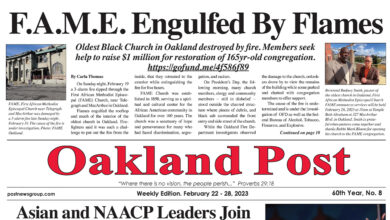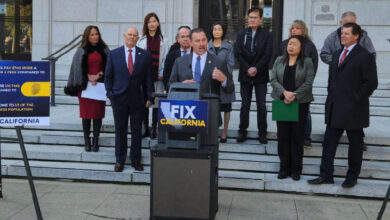Faith Leaders to End Gun Violence Convene at White House

By Magaly Muñoz
Four years after passing Measure QQ, which advocated for youth voting in school board elections, Alameda County is progressing towards granting 16 and 17 year olds the opportunity to vote for their district directors in the upcoming November election.
The process for this outcome has been frustrating and somewhat slow for those who advocated for the measure. Two school board elections came and went since the measure was passed by 67% of the vote in 2020- one in 2022 and a special election in 2023- with many saying that would’ve been the perfect opportunity to test out the voting process.
At the time of the fall special election, the county Registrar of Voters (ROV) missed the deadline to introduce new voting systems, which were required in order to register the eligible teens for the election.
Sources told the Post that there had been considerable back and forth between the ROV and the city council, who needed to pass an ordinance to authorize teen voting, about when they would see tangible plans to make this happen. The ROV had allegedly not been very communicative with the city.
Now, the council has passed a first reading of the ordinance, and should everything run smoothly, eligible students could vote for one of the four school board seats in the fall.
Sam Davis, Oakland Unified District 1 director and board president, represented the students who participated in the voting initiative at the city council’s meeting. He told the Post he’s advocated for this measure since the beginning and is excited to see their years of efforts come to fruition.
“There’s been some different hoops to jump through, but it makes it all the more rewarding that this actually happened,” Davis said.
Davis explained that lowering the age to 16 and 17 will allow teens to get a sense of how the democratic process works before they get to vote in larger elections once they turn 18. He said with the current political climate, it’s important that teens know how to make informed decisions about their representatives.
Lukas Brekke-Miesner, Executive Director of Oakland Kids First (OKF), the group that assisted in pushing the 2020 measure forward, told the Post that he won’t feel real victory until everything is set in stone and students are standing in the voting line.
He said the teen voting was vital because it allows students to hold the board accountable when making decisions that directly affect them. Students have shared with him that they often have felt like their words were going through one ear and out the other when addressing the board, but this new voting changes how their voices are heard.
In 2022, Measure S for noncitizen parent voting, passed by 66% of the votes, but as of today, no word has been given on when that will see implementation in the city.
In 2016, San Francisco passed a similar measure for non-citizen school board voting but was quickly met with a lawsuit by the United States Justice Foundation and the California Public Policy Foundation, that is still ongoing. Results of that case will help determine what will happen in Oakland school board elections.
Domenichi Morris, lead organizer with OKF, said they try to involve undocumented parents’ voices as often as possible through community forums because they value the care and input parents have in their child’s lives.
With the ordinance now approved, Oakland will enter into a memorandum of understanding (MOU) with the city of Berkeley, who also passed youth voting in 2016. The MOU states that the city of Oakland and Berkeley Unified School District (BUSD) will take on the primary costs of youth voting.
While costs may vary depending on how many voters are registered or by type of election, standalone or special, the November election could cost Oakland $20,672 – $22,848, based on current pre-registered voters. This number is expected to fluctuate now that youth voting is beginning its implementation in the city.
The MOU also states that Oakland and BUSD would be responsible to pay any litigation costs Alameda County might incur if sued for anything related to youth voting. The county would in turn compensate both parties due to Alameda’s negligence or willful misconduct performing its duties.
A second reading of the ordinance in order to solidify teen voting in Oakland is scheduled for July 16.




